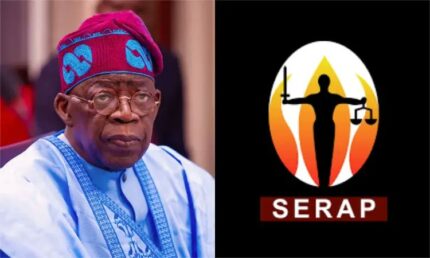The Socio-Economic Rights and Accountability Project (SERAP) has filed a lawsuit at the ECOWAS Court of Justice against President Bola Tinubu’s administration and Nigeria’s 36 governors. The suit challenges the alleged misuse of the Cybercrimes (Amendment) Act 2024, which SERAP claims infringes on the rights to freedom of expression, targeting activists, journalists, bloggers, and social media users.
The organization argues that the amended legislation retains vague and repressive provisions, including section 24, which have been used to criminalize legitimate expression, contrary to Nigeria’s human rights obligations under international law.
ECOWAS Court’s 2022 Judgment Ignored
In a landmark judgment delivered on March 25, 2022, the ECOWAS Court declared section 24 of the Cybercrimes Act 2015 as arbitrary, vague, and repressive. The court ordered its repeal, citing its incompatibility with Article 9 of the African Charter on Human and Peoples’ Rights and Article 19 of the International Covenant on Civil and Political Rights.
While the 2024 amendment repealed the original section 24, SERAP claims the revised provisions remain fundamentally flawed. The organization highlights the broad and ambiguous definitions of terms like “cyberstalking” under section 58, which they argue open the door to abuse by authorities and violate the rights to freedom of expression and information.
Allegations of Misuse and Human Rights Violations
SERAP contends that Nigerian authorities have weaponized the Cybercrimes (Amendment) Act 2024 to stifle dissent and media freedom. The provisions have allegedly been misused to arbitrarily arrest, detain, and prosecute individuals for peaceful expression. Activists, journalists, and bloggers have been targeted under accusations such as cyberstalking, criminal defamation, and publishing “offensive” or “annoying” content.
The organization cited examples, including the arrests of activist Dele Farotimi, journalist Agba Jalingo, and several bloggers accused of cyberstalking. These cases, according to SERAP, demonstrate a pattern of suppressing public discourse and intimidating critics.
Cybercrimes Act 2024 and International Human Rights Law
SERAP argues that the amended Cybercrimes Act contravenes international human rights standards, which mandate that restrictions on freedom of expression must serve a legitimate purpose and be proportionate. Instead, the law has reportedly been used to impose harsh penalties on individuals exercising their rights, undermining Nigeria’s commitments under the African Charter and other treaties.
The organization emphasizes the importance of freedom of expression as a cornerstone of democracy and a thriving civil society. SERAP asserts that the amended legislation’s repressive provisions leave a chilling effect on public discourse and media freedom.
SERAP’s Legal Demands and Next Steps
In its suit (ECW/CCJ/APP/03/2025), SERAP seeks declarations from the ECOWAS Court that section 24 of the Cybercrimes (Amendment) Act 2024 is unlawful and inconsistent with Nigeria’s human rights obligations. The organization is also requesting an order directing the government to repeal or amend the controversial provisions to align with international standards.
Additionally, SERAP calls for the court to recognize that the enforcement of section 24 infringes on the rights to freedom of expression, information, opinion, and privacy. A hearing date for the case has not yet been scheduled.
This lawsuit underscores ongoing concerns about the balance between cybersecurity regulations and human rights in Nigeria. SERAP’s challenge aims to hold Nigerian authorities accountable for what it describes as the misuse of legislation to suppress dissent and restrict fundamental freedoms. As the ECOWAS Court prepares to deliberate, the case will serve as a critical test of Nigeria’s commitment to upholding human rights in the digital age.
Table of Contents
Discover more from OGM News NG
Subscribe to get the latest posts sent to your email.














